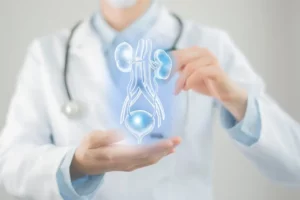Are you experiencing unexpected changes in your body, leaving you feeling puzzled and uneasy? If you’re a woman under 40 and grappling with irregular periods, unexplained mood swings, or sudden bouts of heat, you might be facing premature menopause—a journey no one expects to embark on so soon. We know it’s frustrating, bewildering, and downright uncomfortable. But fear not! In this guide, we’ll shed light on the early signs that might have triggered your concern, seamlessly intertwining them with practical tips. From demystifying the premature menopause diagnosis journey to exploring effective management strategies, we’ll equip you with the knowledge to face this phase head-on. So, let’s get started!
Contents
What Is Premature or Early Menopause?
Premature or early menopause is like a plot twist in the story of a woman’s life, arriving well before the expected time. Unlike the natural process that typically occurs around the age of 50, premature menopause sets in before the age of 40, catching many off guard.
Early diagnosis plays a pivotal role in effectively managing premature menopause. Identifying the signs and seeking medical attention promptly can help individuals explore appropriate treatment options and cope with the physical and emotional aspects of this condition.
Early Signs of Premature Menopause
Understanding the early indicators of premature menopause is key to timely intervention and effective management. These signs can manifest before the age of 40, signaling hormonal changes that warrant attention. Let’s delve into the subtle cues that may signify the onset of premature menopause:
- Irregular Menstrual Cycles
One of the initial signs is irregular menstrual cycles. Women may experience unpredictable patterns, ranging from shortened to prolonged cycles or even missed periods.
- Hot Flashes and Night Sweats
Hot flashes and night sweats, often associated with hormonal fluctuations, can become pronounced during premature menopause. These episodes can significantly impact daily life and disrupt sleep patterns.
- Mood Swings
Hormonal imbalances can contribute to mood swings, irritability, and feelings of anxiety or depression. Recognizing these emotional changes is crucial for timely intervention.
- Decreased Libido
A decline in libido is another potential sign, affecting the intimate aspects of a woman’s life. Open communication with healthcare providers can address concerns and explore solutions.
- Vaginal Dryness
Premature menopause may lead to vaginal dryness, causing discomfort and impacting sexual health. Lubricants and hormone-based therapies can provide relief.
By being attuned to these early signs, individuals and healthcare professionals can work collaboratively to navigate the challenges posed by premature menopause.
What Are The Causes Behind Premature Menopause?
 Exploring the factors contributing to premature menopause unveils a range of influences that can also trigger early menopause. Many of these causes stem from medical treatments, surgeries, or specific health conditions. Essentially, anything that damages the ovaries or disrupts estrogen production can instigate the onset of menopause.
Exploring the factors contributing to premature menopause unveils a range of influences that can also trigger early menopause. Many of these causes stem from medical treatments, surgeries, or specific health conditions. Essentially, anything that damages the ovaries or disrupts estrogen production can instigate the onset of menopause.
- Cancer Treatment and Surgery such as Chemotherapy and radiation can induce premature menopause.
- Surgical procedures, especially those involving the removal of ovaries, can halt hormonal production.
- Smoking has been identified as a lifestyle factor that can contribute to premature menopause.
- Living with HIV or AIDS can be a contributing factor.
- Certain autoimmune disorders can affect the ovaries and contribute to premature menopause.
- Genetic factors play a significant role in determining susceptibility to premature menopause.
- A family history of early menopause may increase the likelihood of experiencing it.
Understanding these causes is paramount for individuals and healthcare providers alike. It enables proactive measures such as fertility preservation and tailored management strategies to address the specific challenges associated with premature menopause.
Premature Menopause Diagnosis
 Understanding whether you are experiencing premature menopause involves a comprehensive diagnostic process conducted by healthcare professionals. Your healthcare provider may employ various tests and inquiries to arrive at an accurate diagnosis.
Understanding whether you are experiencing premature menopause involves a comprehensive diagnostic process conducted by healthcare professionals. Your healthcare provider may employ various tests and inquiries to arrive at an accurate diagnosis.
- Your healthcare provider will inquire about the regularity of your menstrual periods.
- Irregularities or changes in your menstrual cycle can be indicative of hormonal fluctuations associated with premature menopause.
- A discussion about your family history of menopause at an early age is crucial. Genetic predispositions can significantly influence the likelihood of premature menopause.
- A physical examination is likely to be part of the diagnostic process. Physical signs and symptoms, combined with other information, contribute to a comprehensive assessment.
- Blood Test for Hormone Levels, that allows healthcare providers to analyze hormone levels, particularly follicle-stimulating hormone (FSH) and estrogen. Elevated FSH levels and low estrogen levels can indicate ovarian dysfunction.
- Your healthcare provider may explore the presence of other medical conditions that could contribute to your symptoms. This may include investigating thyroid conditions or other hormonal imbalances.
The combination of these diagnostic approaches enables healthcare professionals to gather a comprehensive understanding of your reproductive health and hormonal balance. It is essential to communicate openly with your healthcare provider, providing detailed information about your symptoms, family history, and any relevant health conditions to facilitate an accurate diagnosis.
Can Premature Menopause Be Treated?
The treatment for early or premature menopause varies depending on the underlying reasons for its onset earlier than normal. Given the health risks associated with early menopause, healthcare providers often recommend Hormone Replacement Therapy (HRT) as a primary intervention, unless there are specific reasons making hormone therapy unsafe.
Hormone Replacement Therapy (HRT)
 HRT involves the administration of hormones, such as estrogen and progesterone, to replace the hormones that the ovaries no longer produce in sufficient quantities. This treatment aims to alleviate symptoms associated with menopause and maintain overall health. Here’s how HRT can be an effective way to treat premature menopause:
HRT involves the administration of hormones, such as estrogen and progesterone, to replace the hormones that the ovaries no longer produce in sufficient quantities. This treatment aims to alleviate symptoms associated with menopause and maintain overall health. Here’s how HRT can be an effective way to treat premature menopause:
- Symptom Relief: HRT is known for effectively relieving common symptoms of menopause, including hot flashes, night sweats, and mood swings. By restoring hormone levels, it helps individuals manage these discomforts.
- Bone Health: Estrogen plays a crucial role in maintaining bone density. However, HRT helps in preserving bone health and reducing the risk of fractures.
- Heart Health: Estrogen has cardio-protective effects, and premature menopause is associated with an increased risk of cardiovascular issues. HRT may contribute to maintaining cardiovascular health by mitigating these risks.
- Vaginal and Sexual Health: HRT can address vaginal dryness and discomfort, common issues associated with hormonal changes. It can also enhance libido, improving overall sexual well-being.
- Mental Health: Hormonal fluctuations can impact mood and contribute to mental health challenges. HRT may play a role in stabilizing mood and promoting emotional well-being.
It’s essential to note that while HRT can be effective, its appropriateness varies from individual to individual. Factors such as overall health, medical history, and the presence of specific risk factors influence the decision to pursue hormone replacement therapy. Individuals must discuss the potential benefits and risks with their healthcare providers to make informed decisions about the most suitable treatment approach for their unique situation.
Conclusion
In conclusion, navigating premature menopause requires a multifaceted approach that encompasses early recognition, comprehensive diagnosis, and tailored treatment strategies. At HerMantra, we empower women through education, community support, and expert guidance. Join us in thriving through this transformative journey!
If you are facing menopause related issues, menopause treatment at HerMantra can help. Book your free trial online menopause treatment session now.


